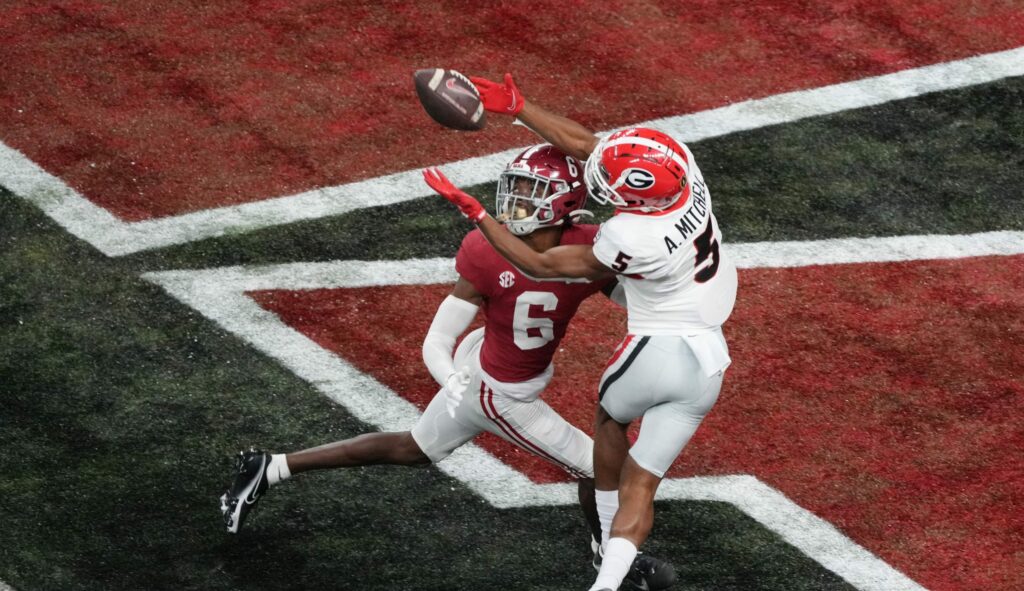 It’s that time of year again my friends. College football season begins this weekend. I’m not sure how that’s possible, but there it is. It’s been 7+ months since our beloved Dogs finally slayed the big bad Bama dragon back on January 10 and won the National Championship. The final score, lest you’ve forgotten, was Us 33, Them 18. You can watch all the glorious highlights here.
It’s that time of year again my friends. College football season begins this weekend. I’m not sure how that’s possible, but there it is. It’s been 7+ months since our beloved Dogs finally slayed the big bad Bama dragon back on January 10 and won the National Championship. The final score, lest you’ve forgotten, was Us 33, Them 18. You can watch all the glorious highlights here.
Full confession: no matter how much I love college football, I’m never ready for the season to begin. Never. I don’t look forward to it. There are many reasons for that.
I’ve written about the joys of college football elsewhere on this blog, particularly the difference between the college and pro game, and since I don’t believe in re-inventing the wheel, I’ll just repeat myself:
“College football is more exciting [than the pro game] and more fun to watch, in my humble and uninformed opinion.
The rivalries are much more intense, and the game-day atmosphere at big-time college football games is unmatched in any other sport.
For game-day excitement, try the Big House in Ann Arbor when Michigan plays Ohio State (ask Michigan alum Tom Brady about it). Or the Horseshoe in Columbus when it’s played there. Or in Oklahoma during Bedlam. Utah during the Holy War or Oregon’s Civil War. Also try finding cool names like these for NFL rivalries. You won’t.
The NFL has nothing—nothing—to compare to the Iron Bowl. Or the World’s Largest Outdoor Cocktail Party. Notre Dame vs. Southern Cal. Texas and Texas A&M (though temporarily suspended). Catholics vs. Convicts.
I’m not saying there aren’t great rivalries in the NFL—the Redskins and Cowboys, Patriots and Jets, and Packers and Bears all come to mind.
But it’s not the same as the blood feuds in college football, where many of these rivalries go back 130 years. The NFL has been around since the 1920s, but most franchises barely predate the 1960s. And rivalries are divisional (Cowboys-Redskins) not geographical, like Florida and Florida State, and don’t have nearly the emotional intensity of a life and death college football grudge match.”
And it’s that last part that always makes it difficult for me to welcome the college football season—the “emotional intensity”. Let me explain.
Long-suffering readers of this blog know I love baseball. I love the rhythm of the game and the leisurely-ness of the season, as it meanders across 7 months of the year. If you don’t win today’s game, no big deal. There’ll be a hundred more to play, for months yet, nothing to get upset about. And the rivalries are fun, not death grudge matches [Game 7 of the World Series is another universe]. Yes, Braves fans don’t like the Mets or the Dodgers and vice-versa but it’s not civil war. It’s baseball. Have a hot dog. Relax.
But college football is different, especially now that UGA has won it all. Nothing less will do now, and if you lose one game, that’s it, your season is done. No trip to the College Football Playoff for you.
Yes, I know that’s not literally true, but you have to be very careful when you lose that one game. Georgia lost to Bama in last year’s SEC championship game and still made the Playoff only because we went undefeated through the rest of the season. Gasp. One little slip-up against Kentucky or South Carolina would have spelled doom. Pro football teams can lose 7 or 8 games and still make the playoffs, even win the Super Bowl. Not in the college game, and not even close.
The intensity of the season, of every play, every dropped pass, every boneheaded fumble by our “college” QB (who’s old enough to draw Social Security), every missed field goal, every interception, every blown pass coverage—everything is always on the line, waiting to derail the entire season.
And unlike in baseball, there’s no 3-game series to make up for a bad loss. There’s no pre-season to work out the kinks in the offense, or begin to gel as a team, as in the pros. It’s all or nothing all the time, beginning with the very first snap.
Even then you have to count on a bit of luck to wind up in the top four and get invited to the Playoff. Teams ahead of you in the rankings have to lose to someone they weren’t supposed to. You have to catch a lucky break. Sometimes it’s pure chaos, and yes, that can be enormously fun to watch—and it is—if it doesn’t give you an ulcer in the meantime.
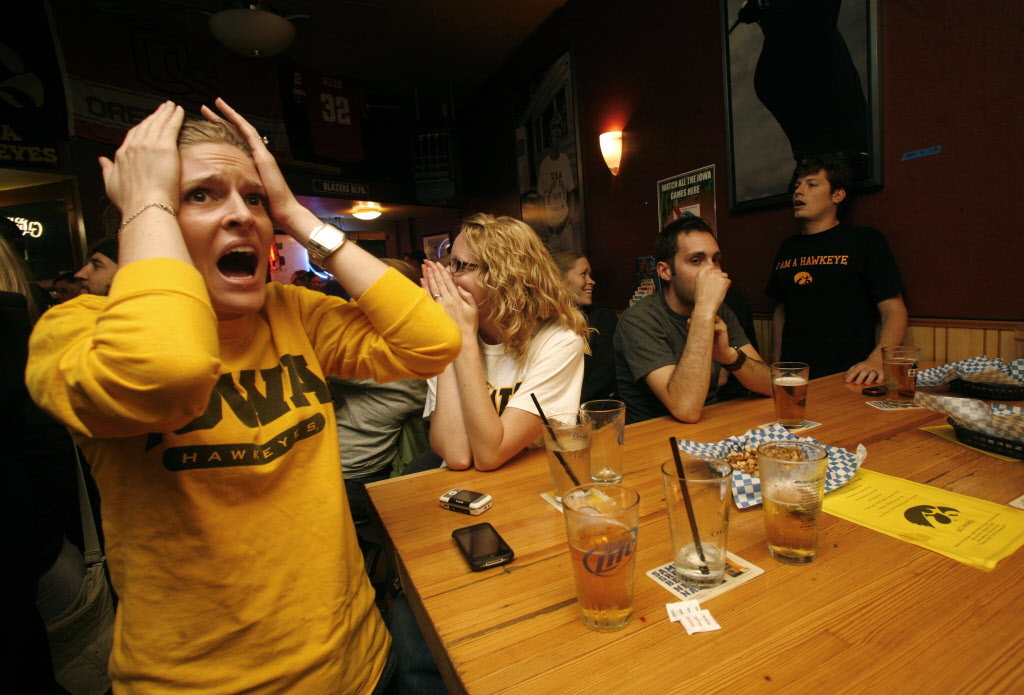
Then there’s the sheer amount of good ‘ol fashioned hate that you constantly harbor for all your opponents. I’m talking seething, teeth-clenched, can’t stand those a-holes hatred. Florida. Bama. Auburn. Tennessee. Texas A&M. LSU. Kentucky. South Carolina, Ole Miss, Mississippi State, Arkansas, Georgia Tech.
Not to mention the teams not in your conference that you don’t even play but that you just have to hate on principle, like Ohio State, Clemson, Oklahoma, USC, Notre Dame, Michigan, Texas, Penn State. Some of these teams you hate because they’re just arrogant; some because their coach is a jackass; some because their coach is an arrogant jackass (every Florida coach till now, and maybe the new guy too once we get to know him). Not to mention, what grownup goes by the name Dabo or Jimbo? C’mon man.
For some reason, the level of jackass-ery among college coaches is astounding. They often run their mouths denigrating other teams at a level that you never see in any other major sport. There are the occasional NFL jackass coaches (see Rex Ryan), but they don’t usually last long. No major league baseball manager denigrates other teams. But college football coaches do it all the time. Partly that’s a function of there being only four playoff spots, and no parity of strength of schedule, so coaches often talk up their team while denigrating others.
But jackass coaches long pre-date the current playoff system. The college game just seems to attract them. Steve Spurrier at the University of Florida is the primo example, and of course he’s long gone. Many others have taken his place, and many of them coached at Florida. Incidentally, I can hear my mother’s voice saying, “Stanley, you don’t hate anybody!” But this is college football hate, and it’s different. Even God hated Steve Spurrier.
As you can see, it’s all mentally and emotionally exhausting. But it must be done if you’re going to follow the sport, week in and week out, from August till January. There’s just no other way.
By now you’re thinking, geez Stan, get a grip. No one is making you do this. And you’re right. I’ve tried in the past to just be a casual fan. Why put my emotional state in the hands of 18–22-year-olds? Who cares if we lose to Florida? It’s not the end of the world. No big deal. Have a hot dog. Relax.
But in college football, that just doesn’t work. For reasons that only psychologists can explain, there’s an emotional attachment that fans feel towards college football teams that is different than any other American sport (though I believe it holds in European football as well).
Let the trash-talking, complaining about weak schedules, wailing, and gnashing of teeth begin. A short slate of games kicks off this weekend, then #3 Georgia will tee it up against #11 Oregon on September 3 at Mercedes-Benz Stadium in Atlanta. The madness will continue through the National Championship game next January 9, five months from now.
Keep the crying towel handy. Grab your foam fingers, order a side of tranquilizers, and hang on.

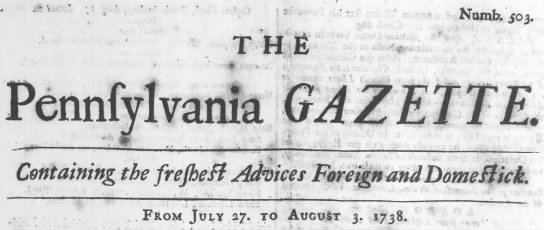
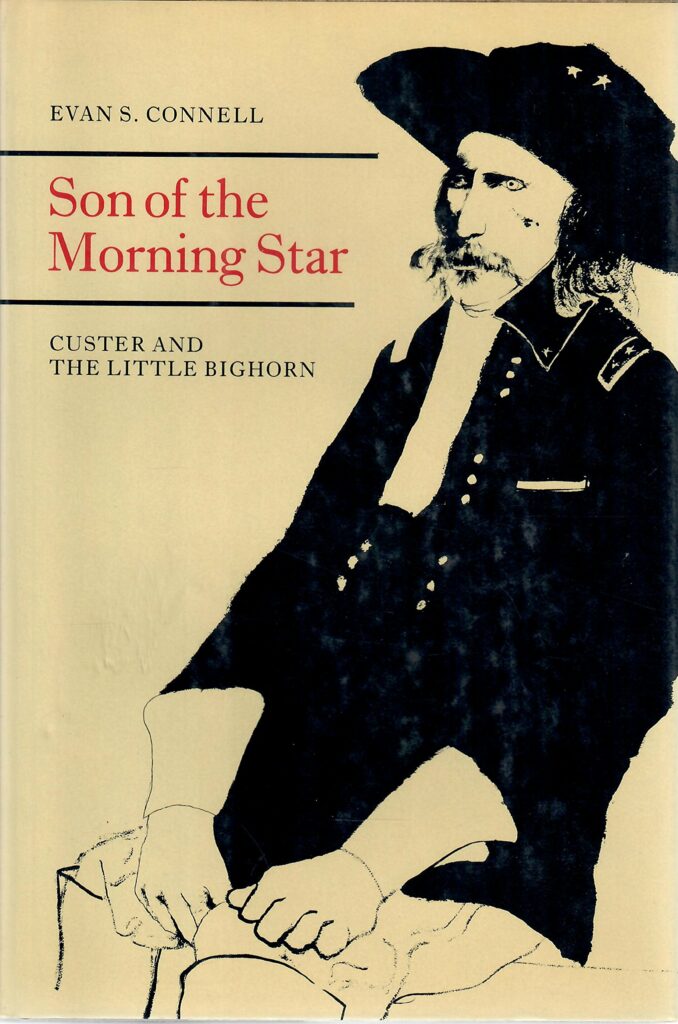 Item: Books, or A Case of Serendipity: I recently bought a copy of T.J. Stiles’s 2015 book, Custer’s Trials: A Life on the Frontier of a New America, which won the 2016 Pulitzer Prize for History. As I was putting it on the appropriate shelf in my office, I noticed immediately beside it my copy of Evan Connell’s 1984 best-seller on Custer, Son of the Morning Star, which has been hailed as a masterpiece. I remember buying the book as an undergraduate at UGA just getting interested in history. Why had I never read it? And who was Evan Connell? I remember reading articles in the mainstream media (like Time magazine) about how this unusual book and author surprisingly took the literary world by storm that year. I did the usual Google searches on Connell and found myself fascinated by what I discovered. Suffice it to say, Connell is considered a writer’s writer, at home in nearly every genre, from fiction, essays, and short stories, to history, biography, and poetry. The contemporary of Jack Kerouac, Philip Roth, and John Updike labored in comparatively undeserved obscurity, but hiding in plain sight was part of his deliberate brand. Connell, who died in 2013 at age 88, was a lifelong unmarried loner, the opposite of a self-promoter, who hated publicity and never courted the spotlight. He granted few interviews (none on camera) and if there’s a picture out there anywhere of him smiling, I’ve never seen it. He never did public readings of his work, never spoke publicly about his writing, never taught classes about writing or literature. He lived in the Bay Area much of adult life, spent some time in local watering holes, and formed few permanent attachments. He
Item: Books, or A Case of Serendipity: I recently bought a copy of T.J. Stiles’s 2015 book, Custer’s Trials: A Life on the Frontier of a New America, which won the 2016 Pulitzer Prize for History. As I was putting it on the appropriate shelf in my office, I noticed immediately beside it my copy of Evan Connell’s 1984 best-seller on Custer, Son of the Morning Star, which has been hailed as a masterpiece. I remember buying the book as an undergraduate at UGA just getting interested in history. Why had I never read it? And who was Evan Connell? I remember reading articles in the mainstream media (like Time magazine) about how this unusual book and author surprisingly took the literary world by storm that year. I did the usual Google searches on Connell and found myself fascinated by what I discovered. Suffice it to say, Connell is considered a writer’s writer, at home in nearly every genre, from fiction, essays, and short stories, to history, biography, and poetry. The contemporary of Jack Kerouac, Philip Roth, and John Updike labored in comparatively undeserved obscurity, but hiding in plain sight was part of his deliberate brand. Connell, who died in 2013 at age 88, was a lifelong unmarried loner, the opposite of a self-promoter, who hated publicity and never courted the spotlight. He granted few interviews (none on camera) and if there’s a picture out there anywhere of him smiling, I’ve never seen it. He never did public readings of his work, never spoke publicly about his writing, never taught classes about writing or literature. He lived in the Bay Area much of adult life, spent some time in local watering holes, and formed few permanent attachments. He  died alone in Santa Fe, New Mexico. And yet his novels reveal a remarkably penetrating insight into human relationships that are astonishing for someone who seemed to spend most of his life shunning them. His 1959 novel Mrs. Bridge (a National Book Award finalist) was praised as a masterpiece of spare, lean, concise story-telling, with not a spare word in it, as was his 1969 follow-up, Mr. Bridge. I bought and devoured them both and wished for more. I finally also read Son of the Morning Star (published by then-little-known North Point Press in Berkeley, now owned by FSG) and found it beautifully written and moving as well. The New York Times called it “impressive in its massive presentation of information” and added that “its prose is elegant, its tone the voice of dry wit, its meandering narrative skillfully crafted.” The Washington Post said it “leaves the reader astonished,” and the Wall Street Journal called it “a scintillating book, thoroughly researched and brilliantly constructed.” I can confirm that all of this is true. Happily, for people like me who are fascinated by him, there’s a new literary biography of Connell out by Steve Paul, Literary Alchemist: The Writing Life of Evan S. Connell, published in 2021 by the University of Missouri Press. And so, through the serendipity of shelving one book, Evan Connell is now on my list as a favored author whose writings I plan to work through patiently and in their entirety, one bite at a time. I’ll be spending considerable time with him in the coming years. If you love the power of words, I invite you also to get to know this talented, mysterious man in the only way we can—through his writing.
died alone in Santa Fe, New Mexico. And yet his novels reveal a remarkably penetrating insight into human relationships that are astonishing for someone who seemed to spend most of his life shunning them. His 1959 novel Mrs. Bridge (a National Book Award finalist) was praised as a masterpiece of spare, lean, concise story-telling, with not a spare word in it, as was his 1969 follow-up, Mr. Bridge. I bought and devoured them both and wished for more. I finally also read Son of the Morning Star (published by then-little-known North Point Press in Berkeley, now owned by FSG) and found it beautifully written and moving as well. The New York Times called it “impressive in its massive presentation of information” and added that “its prose is elegant, its tone the voice of dry wit, its meandering narrative skillfully crafted.” The Washington Post said it “leaves the reader astonished,” and the Wall Street Journal called it “a scintillating book, thoroughly researched and brilliantly constructed.” I can confirm that all of this is true. Happily, for people like me who are fascinated by him, there’s a new literary biography of Connell out by Steve Paul, Literary Alchemist: The Writing Life of Evan S. Connell, published in 2021 by the University of Missouri Press. And so, through the serendipity of shelving one book, Evan Connell is now on my list as a favored author whose writings I plan to work through patiently and in their entirety, one bite at a time. I’ll be spending considerable time with him in the coming years. If you love the power of words, I invite you also to get to know this talented, mysterious man in the only way we can—through his writing.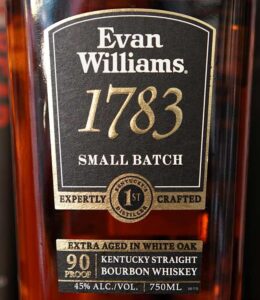
 Item: Currently Reading: The Last Chronicle of Barset, by Anthony Trollope (originally published in 1867), the final volume (of 6) in the Barsetshire series that begins with The Warden (1855) then continues with Barchester Towers (1857), Doctor Thorne (1858), Framley Parsonage (1861), and The Small House at Allington (1864), chronicling the always interesting goings-on in the fictional county of Barsetshire and its cathedral town of Barchester during the height of the Victorian Era. The county is peopled with delightful almost-living characters like The Rev. Mr. Quiverful, Mrs. Proudie, Sir Omicron Pie, Dr. Fillgrave, Sir Abraham Haphazard, Sir Raffle Buffle, and many, many others. The series is beloved by Trollope fans, who are legion, ranging from actor Alex Guinness (Obi-Wan Kenobi), who never travelled without a Trollope novel, to economist John Kenneth Galbraith, to author Sue Grafton. It’s taken me 14 years to read the series, not because the books are hard to read—just the opposite; one critic said they’re like eating peanuts, hard to stop—but because I let too many years elapse between volumes. After this, it’s on to Trollope’s 6-volume Palliser series, which I hope to finish in half the time. Maybe I’ll read those straight through? At any rate, Trollope is also one of my favorite authors, not only for his wonderful books but because of how he wrote them. He famously kept to a disciplined schedule, putting in 3 hours at his writing desk every day before going to his real job at the Post Office, where he is credited with introducing the ubiquitous red pillar mailbox to the United Kingdom (seen here). His literary output was prodigious by any standards: 47 novels, 42 short stories, 5 travel books, 2 works of non-fiction, and an auto-biography. I intend to read them all.
Item: Currently Reading: The Last Chronicle of Barset, by Anthony Trollope (originally published in 1867), the final volume (of 6) in the Barsetshire series that begins with The Warden (1855) then continues with Barchester Towers (1857), Doctor Thorne (1858), Framley Parsonage (1861), and The Small House at Allington (1864), chronicling the always interesting goings-on in the fictional county of Barsetshire and its cathedral town of Barchester during the height of the Victorian Era. The county is peopled with delightful almost-living characters like The Rev. Mr. Quiverful, Mrs. Proudie, Sir Omicron Pie, Dr. Fillgrave, Sir Abraham Haphazard, Sir Raffle Buffle, and many, many others. The series is beloved by Trollope fans, who are legion, ranging from actor Alex Guinness (Obi-Wan Kenobi), who never travelled without a Trollope novel, to economist John Kenneth Galbraith, to author Sue Grafton. It’s taken me 14 years to read the series, not because the books are hard to read—just the opposite; one critic said they’re like eating peanuts, hard to stop—but because I let too many years elapse between volumes. After this, it’s on to Trollope’s 6-volume Palliser series, which I hope to finish in half the time. Maybe I’ll read those straight through? At any rate, Trollope is also one of my favorite authors, not only for his wonderful books but because of how he wrote them. He famously kept to a disciplined schedule, putting in 3 hours at his writing desk every day before going to his real job at the Post Office, where he is credited with introducing the ubiquitous red pillar mailbox to the United Kingdom (seen here). His literary output was prodigious by any standards: 47 novels, 42 short stories, 5 travel books, 2 works of non-fiction, and an auto-biography. I intend to read them all. How is this even possible? After all the angst, crushed dreams, and vanished hopes of the years spanning Ray Goff (1989-1995), Jim Donnan (1996-2000), and Mark Richt (2001-2015)—particularly the latter—how in the name of the Chapel Bell, Varsity chili dogs, and fried pies is this even possible?
How is this even possible? After all the angst, crushed dreams, and vanished hopes of the years spanning Ray Goff (1989-1995), Jim Donnan (1996-2000), and Mark Richt (2001-2015)—particularly the latter—how in the name of the Chapel Bell, Varsity chili dogs, and fried pies is this even possible?
 It’s that time of year again my friends. College football season begins this weekend. I’m not sure how that’s possible, but there it is. It’s been 7+ months since our beloved Dogs finally slayed the big bad Bama dragon back on January 10 and won the National Championship. The final score, lest you’ve forgotten, was Us 33, Them 18. You can watch all the glorious highlights
It’s that time of year again my friends. College football season begins this weekend. I’m not sure how that’s possible, but there it is. It’s been 7+ months since our beloved Dogs finally slayed the big bad Bama dragon back on January 10 and won the National Championship. The final score, lest you’ve forgotten, was Us 33, Them 18. You can watch all the glorious highlights 